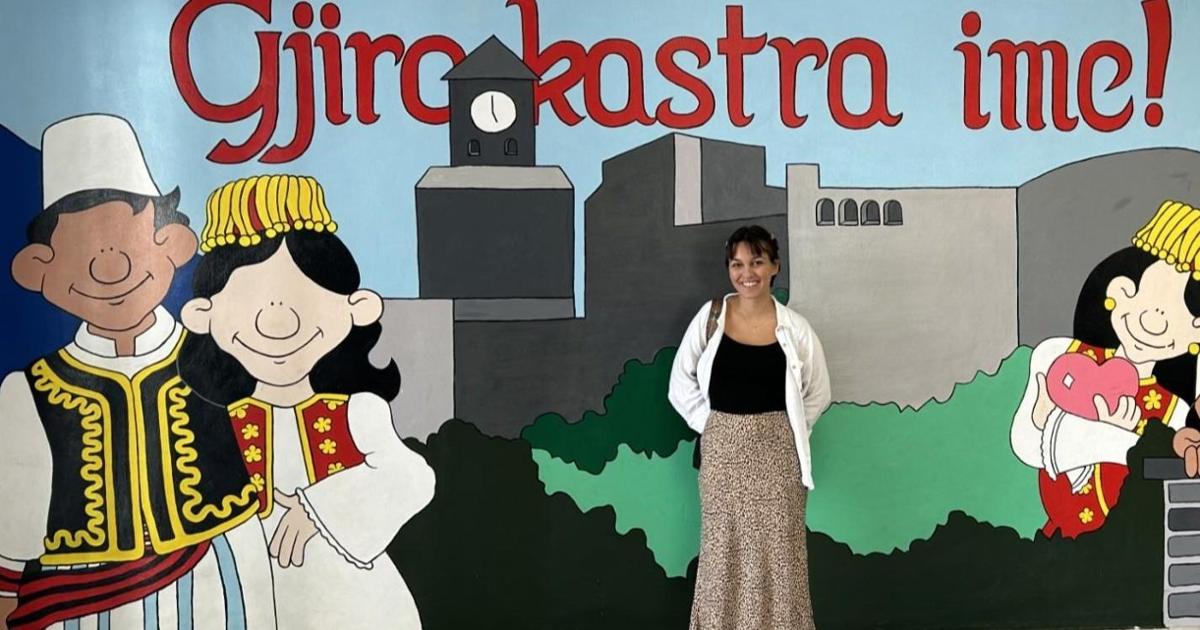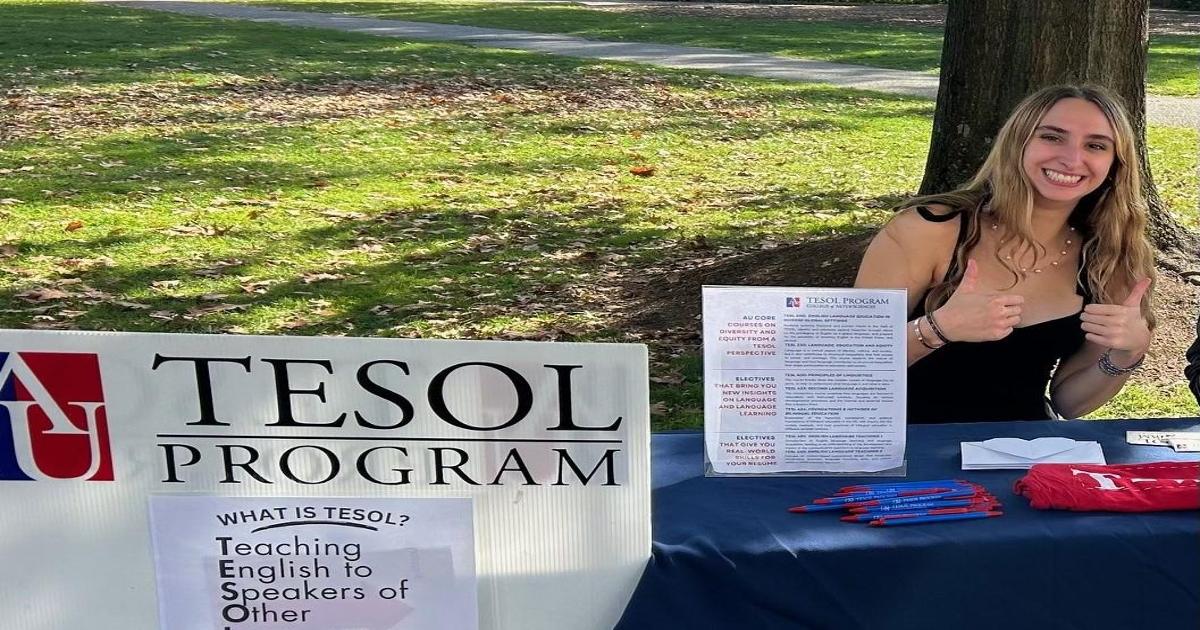TESOL Spotlights Fall 2023
Sara Gace, Fullbright ETA in Albania

I’m living in Gjirokastër, which is a lovely town in the south of Albania. I’ve been working with two primary schools and the university—so a mix of young and adult English learners. I’ve been having a great time applying all the theory and conversations we’ve had in my TESOL classes to real life teaching. Some of the university students I work with are studying to become English teachers themselves! Another class of university students I’ve been teaching is currently studying tourism and cultural heritage. We are working on an exciting project to have students practice their English skills while creating resources that they can use to run informational tour guides.
Albanian is my first language, and it is the language that my parents still use at home. I've told all my classes that I understand enough Albanian that I can help them with translations if they don’t know the word in English. During my time at the primary schools, I’ve found that the younger students engage with me the most in English if my knowledge of Albanian is left ambiguous. However, there is one class in the 2nd grade who overheard me having a fluent Albanian conversation with another teacher and we've been finding it difficult to get those students to use their English-speaking skills around me now. As soon as they found out "my superpower" (as I phrased it to them), they've started responding back to me only in Albanian. For the university students, I've of course been completely candid about my language abilities and, similarly, we use Albanian to fill in the gaps—although, because their vocabulary is much more niche than my general understanding, we end up using Google translate a lot! It’s been such a great experience so far. I’m thankful to Dr. Knowles and the rest of the TESOL department for having done such an incredible job in our classes to set me and the other students up for success! I felt very prepared on the first day of class here! Now that I have some more free time in my day, I'm gearing up to start my graduate school applications. I’m currently looking at dual degree programs that focus on archives and public history, with the hope to focus on creating multilingual community archives.

Soumini Chatterjee MA '24
When I was a child in India, classrooms were invariably teacher-fronted. My schools were no-tech, so there were no promethean boards, laptops, or any other technological devices. We submitted our assignments handwritten. I saw my teachers as encyclopedias; to me, they always knew everything and they were always right. I believed teachers to be reservoirs of knowledge, and I assumed that students were empty vessels. I believed, therefore, that teacher preparation programs were designed to ‘manufacture’ teachers like the ones I’d had as a student myself.
My English teaching career began when I volunteered at the Washington English Center, where all teachers are volunteers. I taught there for two semesters prior to being admitted into the AU TESOL Program. Once assigned a level, each volunteer would receive a physical copy of that level’s specific book and other relevant resources including lesson plans. I thought nothing could be easier than teaching: I just needed to teach the assigned pages and my work would be done. I told myself that I knew the content by heart, and I’d deliver it confidently and effortlessly. In practice, however, I found myself contradicting these presumptions. As a teacher, I worked with adult English learners from many socioeconomic, linguistic, and cultural backgrounds. I saw, to my naïve astonishment, that a Kazakh doctor was seated next to a Peruvian grocer in my ESL class. I realized for the first time how globally significant English is and how imperative it is for both success and scholarship. I noticed that everyone’s need for English is different, but I felt clueless on how to support and scaffold their learning. At the time, I didn’t know what a needs analysis was, and how its influence in lesson planning was so critical. Because of this, I blindly taught by the book. Fortunately, in my first semester as a TESOL graduate student, I learned what a needs analysis is and how understanding your teaching context is fundamental to developing effective pedagogies. Now in my third semester, I think I’m slowly evolving into a teacher who is applying— whenever possible and wherever necessary— a needs analysis to gather relevant data to base her lesson plans on. My professional awareness is thus both growing and ongoing.

TESOL Minor Spotlight: Gigi Gaetti
Living abroad and working as a teacher was never something I considered for my career until I learned about the TESOL program here at AU. I first heard about the program when I registered for a course called Language, Education, and Equity (TESL-220) to fulfill my Diversity & Equity Core requirement. Throughout my time in TESL-220, I grew very interested in the “Equity” portion of the course, and how I could combine my interest in the Korean Peninsula with educational equity. I developed a passion for English education advocacy for North Korean defectors living in South Korea. After talking with my academic advisor, I was sent to the TESOL department’s website and learned about the recently added minor. Shortly after that, I decided to declare my minor!
Now, as a junior majoring in Justice and Law, I am a third of the way through the TESOL Minor program, and it’s truly been one of the highlights of my college career. This semester, I am taking TESL-401 English Language Teaching 1 and TESL-200 English Language Education in Diverse Global Settings, both of which are providing me with incredible real-world experiences. In these classes, I have been learning about the effects of the English language on the rest of the world; how these concepts apply to social justice in the U.S. and abroad; and how to be a well-rounded educator who prioritizes the success of her students over anything else. Additionally, these classes have given me the opportunity to experience first-hand how English is taught in the U.S., particularly in adult education settings. I have had the privilege of visiting three adult English classes here in Washington, DC: At the Carlos Rosario International Public Charter School, the ELTA program here at AU, and a virtual class at The Family Place—all located here in Washington, D.C. Based on the experiences I’ve gained thus far, I can say with certainty that American University’s TESOL Minor program is the perfect mix of learning in the classroom and hands-on experience. What I appreciate most about this program is the amazing group of faculty members—who are all seasoned educators—and their passion for teaching students and bridging communities. I speak from personal experience when I say that all of the TESOL faculty members truly care about each and every student, they want to see us succeed. In addition to their passion for teaching, I felt very welcomed when I joined the TESOL program! I was given so many resources regarding my personal interests with the Korean Peninsula and English education there. All in all, the TESOL department is truly a wonderful place to meet diverse students and educators from all over the world.
